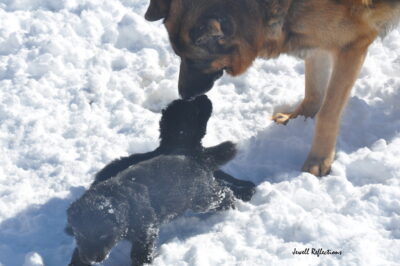By Fran Jewell

Every day I am approached by people that want their dog to “just get along and be friendly” wherever they take them. They also believe that socialization is the key to making a dog do that.
Unfortunately, that is not always the prescription. When socialization is done improperly, it can make things even worse for the dog that is nervous or confused about other dogs.
I think one of the hardest things for humans to understand is the pressure we put on our dogs if our dog is not naturally a social dog. When we have a dog that is nervous or unsure of other dogs, forcing them into uncomfortable interactions can worsen the dog’s feelings about other dogs. Then, a dog that was once a dog that would just ignore or move away from other dogs might actually become reactive or even aggressive toward other dogs.
NOT ALL DOGS ARE SOCIAL!
It is important for us to respect a dog that does not want to be in a social situation. I have many people think they are depriving their dog of relationships with other dogs if they do not teach them to be social. In fact, forcing them into those situations where they are naturally uncomfortable is not quality of life. It will not dissolve those uncomfortable or fearful feelings in most cases. To me, THAT is not quality of life. Keeping a fearful, reactive, or aggressive dog out of those intimate social situations can be much more kind and productive for the dog’s mental health.
I look at a dog’s social desire much like a scale. Some dogs love every dog. There are some breeds that are programmed that way. There are dogs that only get along with a few dogs. Then there are dogs that are absolutely terrified of other dogs. In simplification, I categorize dogs as highly social, medium social, and low or no social.
There are things you can do in all cases to improve the situation, but what most of us think of as socialization may backfire. However, in fairness to the dog, we must first accept who our dog is and move forward with realistic expectations.
Of course, a highly social dog can go most anywhere IF he is taught proper greetings that are not obnoxious. A medium social dog might do better with play dates only with his friends that he has established relationships with. And a low social dog might do better safely in his yard with just you to interact with.
These days, much of a dog’s social desire or needs are based on genetics. While we can influence that to some degree, it usually takes knowledgeable finesse and tons of patience to move a dog from being fearful and reactive to accepting. Many times it will be unsuccessful or only with limited success. In general, this does not apply to a bully reactive dog. That is another story for another day!
Fran Jewell is an Idaho Press Club award-winning columnist, IAABC-certified dog behavior consultant, NADOI-certified instructor #1096 and the owner of Positive Puppy Dog Training, LLC, in Sun Valley. For more information, visit www.positivepuppy.com or call (208) 578-1565.


